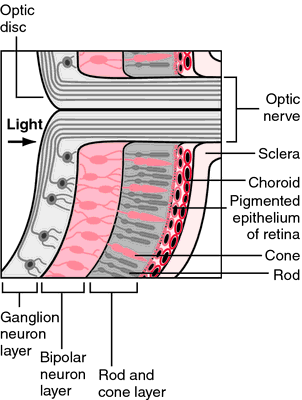Medical term:
epiretinal
retina
[ret´ĭ-nah]the innermost of the three tunics of the eye, surrounding the vitreous body and continuous posteriorly with the optic nerve. The retina is composed of light-sensitive neurons arranged in three layers; the first layer is made up of rods and cones and the other two transmit impulses from the rods and cones to the optic nerve. The rods are sensitive in dim light, and the cones are sensitive in bright light and are responsible for color vision.
Disorders of the Retina. retinopathies are pathologic conditions of the retina; they occur in conjunction with certain systemic disorders, such as hypertension, nephritis, toxemia of pregnancy, and diabetes mellitus.
detachment of the retina is complete or partial separation of the retina from the choroid, the middle coat of the eyeball. It occurs most often in persons with myopia (nearsightedness), but it also can result from trauma to the head.

Structure of the retina showing the rods and cones. From Applegate, 2000.
Miller-Keane Encyclopedia and Dictionary of Medicine, Nursing, and Allied Health, Seventh Edition. © 2003 by Saunders, an imprint of Elsevier, Inc. All rights reserved.
epiretinal
(ĕ″pĭ-rĕt′ĭn-ĭl) [Gr. on, over, + L. rete, net]On the surface of the retina.
Medical Dictionary, © 2009 Farlex and Partners
Latest Searches:
www - WuScope - Wurster - Wundt - Wunderlich - Wuchereriasis - WSchter - wryneck - wry - writing - writhing - writers' - wristdrop - Wristaleve - wrist - wrisbergi - Wrisberg - wrinkled - Wrightlock - Wright -
- Service manuals - MBI Corp